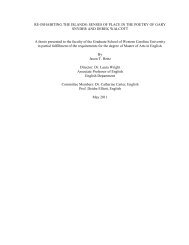SUMMERS, KAREN CRADY, Ph.D. Reading Incest - The University ...
SUMMERS, KAREN CRADY, Ph.D. Reading Incest - The University ...
SUMMERS, KAREN CRADY, Ph.D. Reading Incest - The University ...
Create successful ePaper yourself
Turn your PDF publications into a flip-book with our unique Google optimized e-Paper software.
24<br />
introduction of Amans, the unsuccessful lover who must be instructed by Genius. <strong>The</strong><br />
ambiguity of English word love is crucial to Amans’ education because he fails to<br />
understand its three possible meanings: lust or cupiditas, lawful romantic love expressed<br />
in marriage, and spiritual love or charity. Gower prepares us for this ambituity when,<br />
despite his celebration of love as the source of social harmony in the prologue, he also<br />
foreshadows that the rest of the poem will modulate between love as “vertu” and as<br />
“vice” (Pr. 79-80). It is this second sense of love, which may be either virtuous or<br />
vicious, that Gower focuses on in book one and the subsequent books of the Confession<br />
Amantis.<br />
Love, then, in all its forms and perversions—Godly, kingly, parental, impersonal,<br />
lustful, and most of all incestuous—will become the controlling concern of the poem.<br />
Love in Confessio Amantis bears careful scrutiny, for ambiguity haunts the meaning of<br />
the term. D.W. Robertson, in his examination of the medieval mind-set, identifies a<br />
dichotomy:<br />
[Charity is] the New Law which Christ brought so that mankind might be saved.<br />
Under the Old Law. . . salvation was not possible. . . . <strong>The</strong> opposite of charity is<br />
cupidity [named for the pagan, incestuous god of love], the love of one’s self or of<br />
any other creature—man, woman, child, or inanimate object—for the sake of the<br />
creature rather than for the sake of God. Just as charity is the source of all virtues,<br />
cupidity is the source of all vices, and is responsible for the discontents of<br />
civilization. <strong>The</strong> two loves, both of which inflame, and both of which make one<br />
humble, are accompanied by two fears. Charity, like wisdom, begins with the<br />
fear of the Lord; and the fear of earthly misfortune leads to cupidity and<br />
ultimately to despair and damnation. . . .charity builds the city of Jerusalem, and<br />
cupidity builds the city of Babylon. . . . This opposition between the two loves, or<br />
the two cities, is fundamental to an understanding of medieval Christianity<br />
(Robertson 5).
















